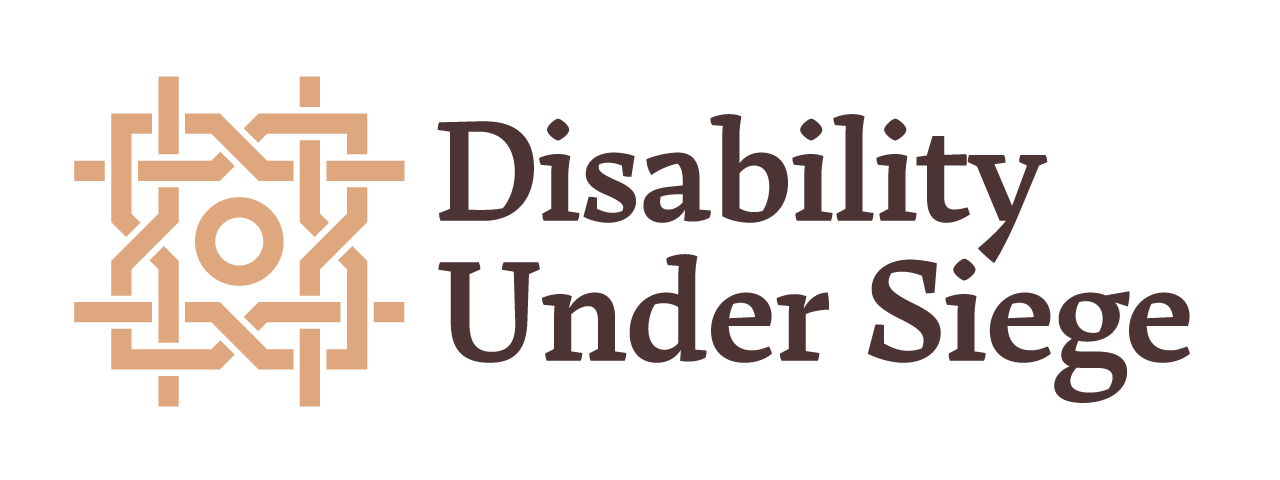Network and Knowledge Exchange Award
The Disability Under Siege Network made funds of up to £30,000 available to support impactful projects, network-building and activities to enhance sustainable and scalable local and regional capacity from an interdisciplinary perspective for those with disabilities in formal and non-formal educational settings.
The successful recipients of this award are:
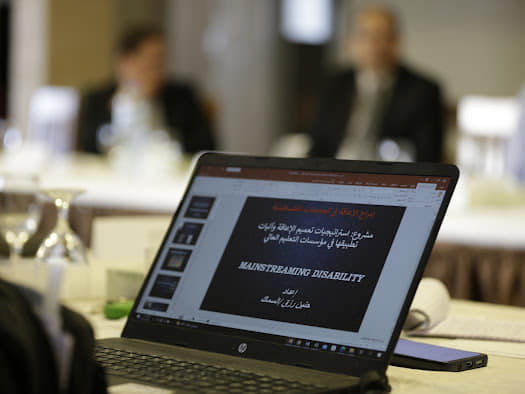
Mainstreaming Strategies and the Application Mechanisms in Higher Education Institutions
Led by Al-Quds University in Palestine, this research project works in collaboration with An-Najah National University and the Islamic University, to study the mainstreaming of people with disability in higher education institutions, and to identify strategies followed by higher education institutions for educational quality and mainstreaming facilities for different types of people with disability.
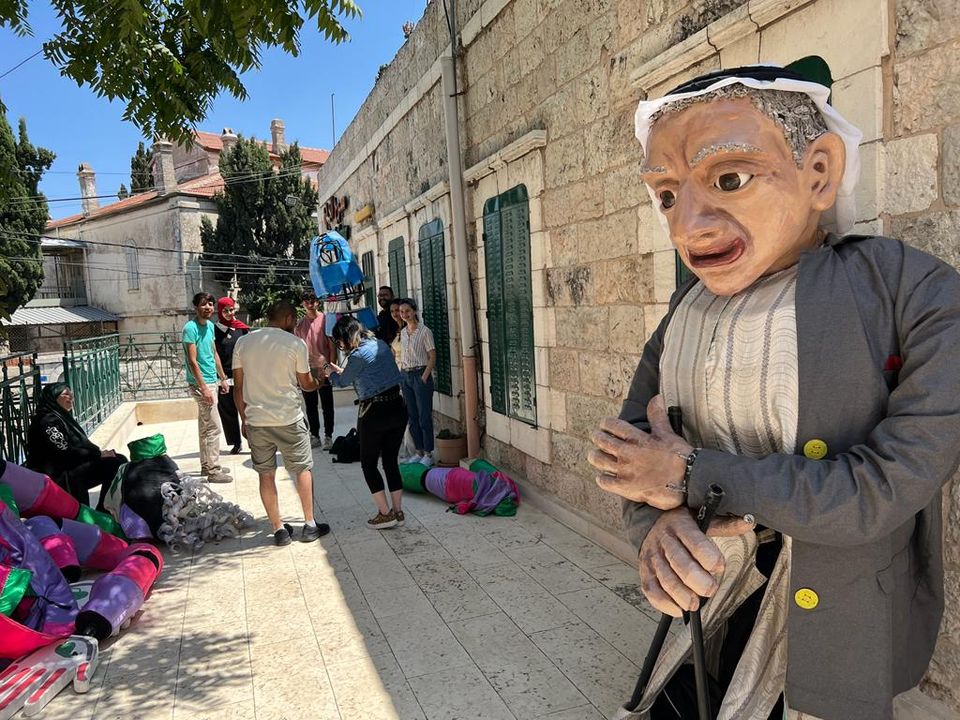
Al-Harah Theater Company
The project aims at enhancing the inclusion of people with disabilities into the performing arts sector while opening further and new opportunities for people with disabilities for work and participation in Palestine. The project will work with Qader for Community Development, to create awareness and changing social stigmas through theater where people with disabilities are included and their messages are conveyed.
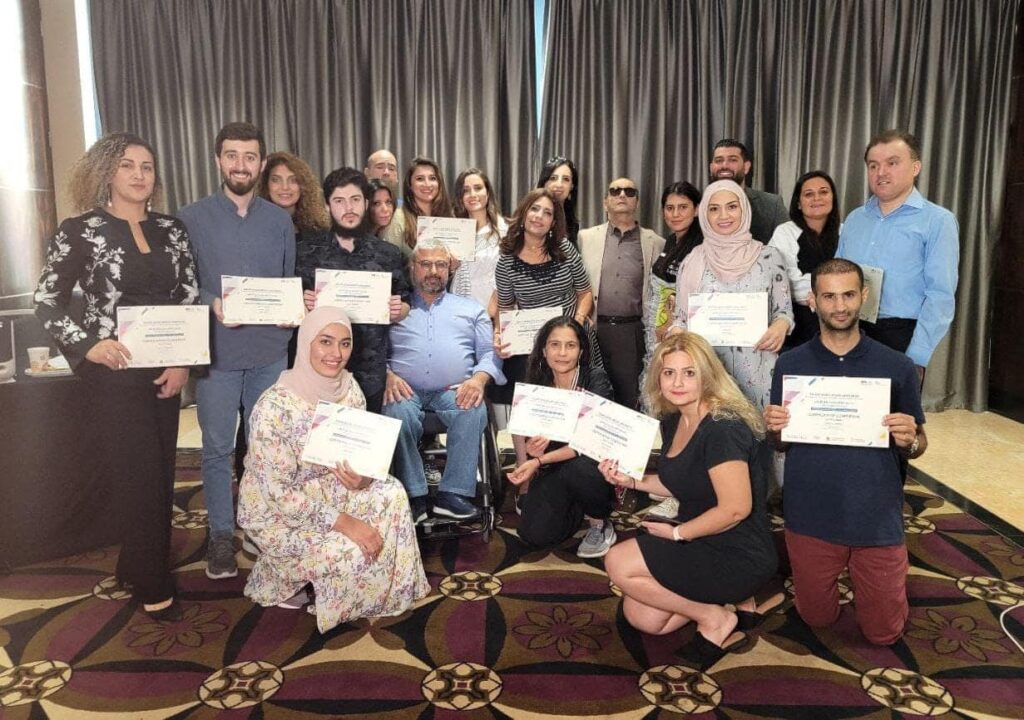
Towards inclusive media production: Training workshops for media organizations and media educational programs at Lebanese Universities
This project is a coordinated training investment drawing from the experiences of the Disability Hub, coordinated by Dr Itab Shuayb, and audio-visual media organizations and university media communication programs in Lebanon. It is devised to respond to increasing demands for training on the principles of the CRPD and inclusive development, including inclusion, accessibility, reasonable accommodations, and inclusive and universal design.
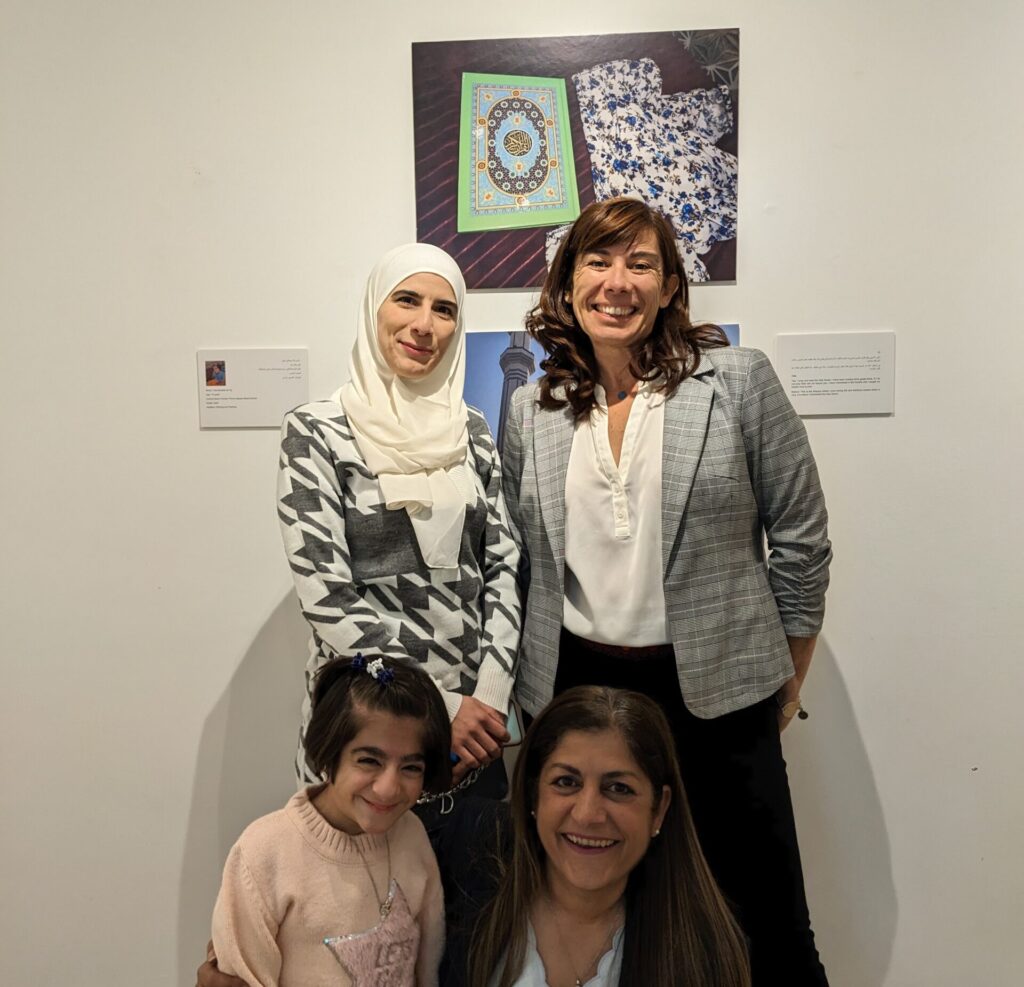
Art Advocacy: Youth Views of Disability
In accordance with global and national calls Jordan’s government has been heavily investing in projects to promote inclusivity. A small pilot project in Jordan, conducted by the University of Jordan, with non-disabled students has shown there is still a prevalent narrative of disability that excludes and ‘others’ disabled persons. To counter this view this project will bring disabled and non-disabled youth together through conversation and art.
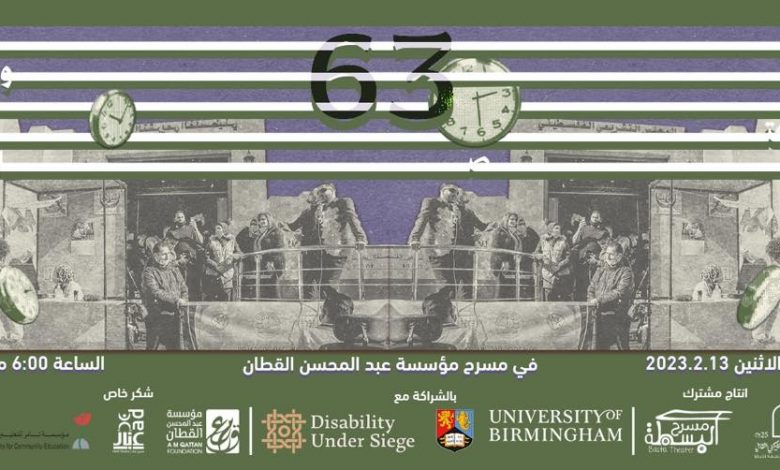
63 Days Sit-in
In October 2021, amid the Covid-19 pandemic, people with disabilities in Palestine initiated a movement to direct their right to have a just and inclusive health insurance. 63 days after their sit-in at the Palestinian Legislative Council under difficult circumstances, the social movement of people with disabilities were able to realise their first goal of providing an inclusive health insurance for people with disabilities, “63 Days Sit-in” is a project that aims to creatively document and reflect on the powerful experience of the movement led by people with disabilities in Palestine.
Research and Engagement Award
The Disability Under Siege Network made funds available to enable the investigation and reframing of the discourses on disability in contexts of education and conflict. Three large-scale research projects (up to £125,000 each), with comparative projects across Jordan, Lebanon and Palestine have been commissioned.
The successful recipients of this award are:
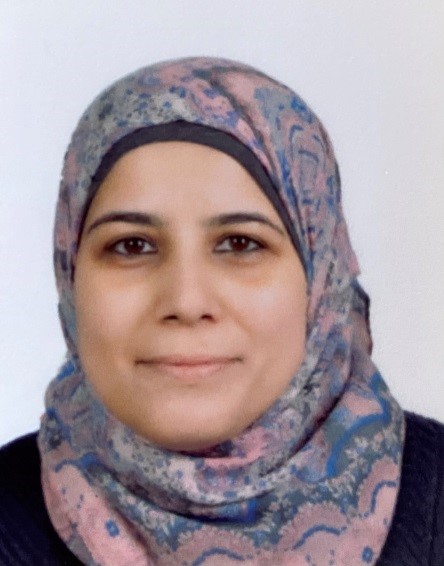
A Human Centred and Community Based Participatory Research Approach to Education Among Young People with Disabilities Living Under Occupation
Suzan Mitwalli is an academic researcher at the Institute of Community and Public Health – Birzeit University. Her main research interest is mental health, and she has worked for many years on an intervention research with the Community Based Rehabilitation organization (CBR). She has experience in both quantitative and qualitative research and community-based interventions.
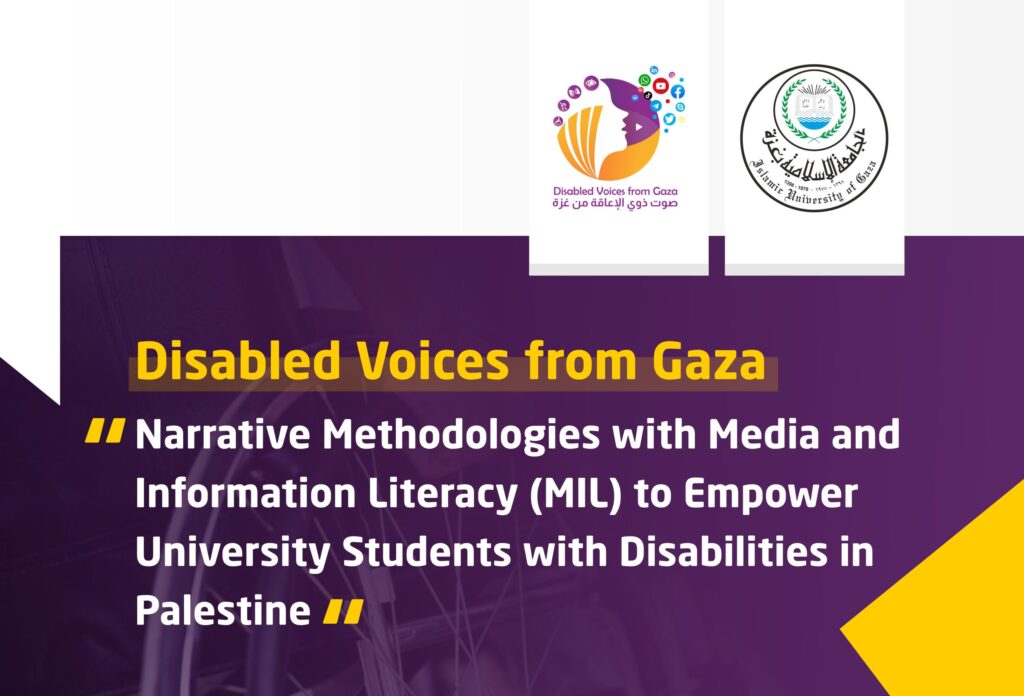
#DisabledVoicesfromGaza – narrative methodologies with media and information literacy (MIL) to empower university students with disabilities in Palestine
This capacity-building oriented research project brings together academics and third sector organisations from the creative and advocacy sectors, based both in the UK and Palestine. In collaboration, the team will empower 100 Palestinian university students with disabilities living in besieged Gaza, Palestine, to effectively communicate and produce narratives about their lived experiences.

Insights into government initiatives concerned with building inclusive schools in Jordan and Lebanon
Led by Maha Khochen-Bagshaw Maha, an international consultant specialising in inclusion and equity in education. She is interested in promoting access to and quality of education for all children with focus on those at risk of exclusion. To this end, she researches, trains and advises on inclusive education related policy and practice. Her work covers a range of countries in Europe, the Middle East, North and East Africa as well as Central Asia.
This research investigates government inclusive education initiatives in four mainstream schools in each of Jordan and Lebanon, and the extent these schools promote equity and inclusion principles. The ultimate goal is to use the findings from these countries to conduct cross country analysis to understand the similarity and differences in approach and provision.
Early Career Fellowships
The Disability Under Siege Network has funded two early career research posts of up to £45,000 to support interdisciplinary research into the area of inclusive education in Lebanon and Palestine.
The successful recipients of this award are:
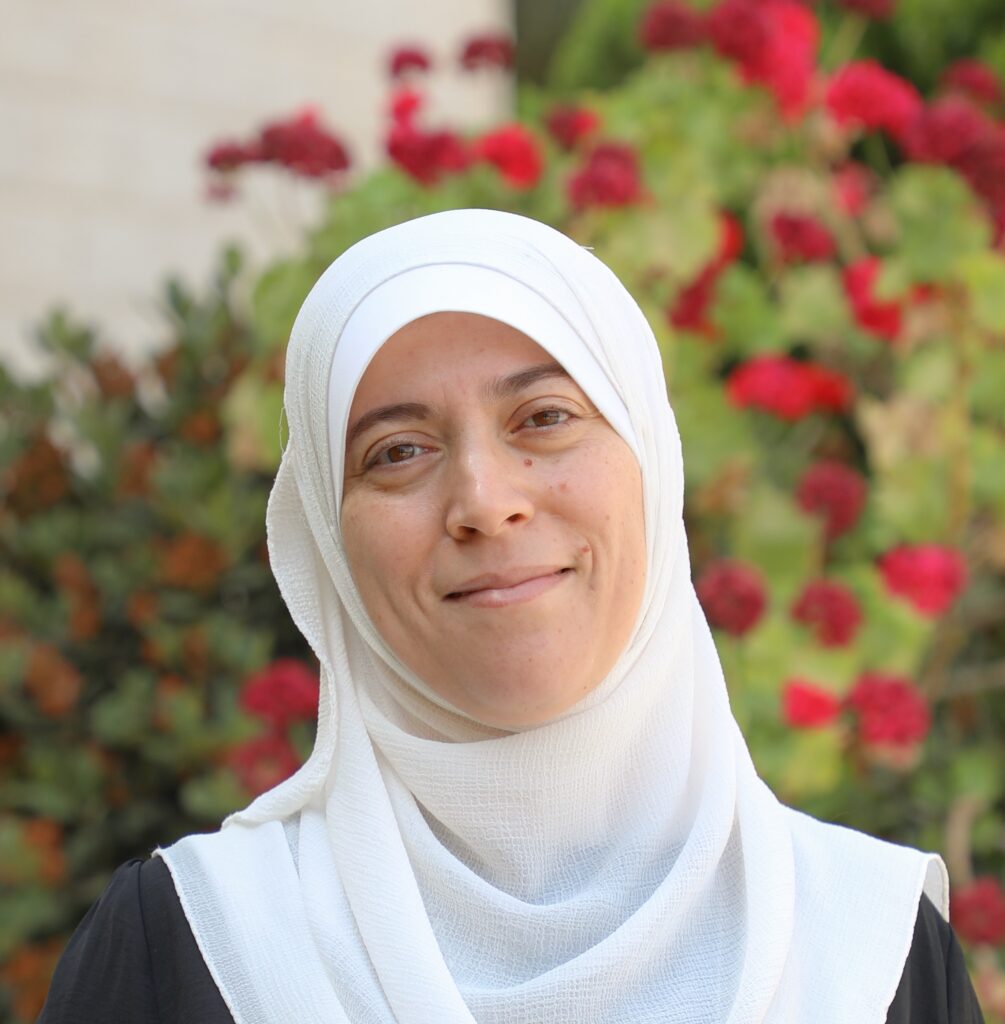
Dr Rula Ghandour
Dr Rula Ghandour is a researcher at the Institute of Community & Public Health (ICPH) at Birzeit University, Palestine. She is currently completing her PhD addressing adolescents’ menstrual health among Palestine Refugee camp dwellers. She worked previously as a research and teaching assistant at the ICPH. The primary aim of Rula’s research is to understand the lived disability experience of Palestinian West Bank adolescent girls aged 15-18 years old, to understand their daily lives at home and in their communities.

Joelle Boutros
Joelle Boutros is a researcher at the Centre for Lebanese Studies, working on the history of social movements in post-war Lebanon. She also served at the Legal Agenda’s Archiving and Documentation Department, writing and documenting key cases and historical incidents related to social and judicial movements in Lebanon. Her research will track the history of The Lebanese Union for People with Physical Disabilities (LUPD), its evolution and development, tactics used and its role in promoting the full inclusion of people with disabilities in society from the 1980s to the present day.
Impact Acceleration Awards

Promoting Evidence-Based Policies for Children and Adolescents with Disabilities in the Occupied Palestinian Territory
Dr Rula Ghandour, Birzeit University
The study seeks to conduct a comprehensive analysis of the child functioning module (CFM) within the Multiple Indicator Cluster Survey (MICS) 2019-2020 data to gain a deeper understanding of the prevalence and distribution of functional difficulties among children and adolescents aged 2-17 in the oPt. The research will also explore factors associated with these difficulties.

Enhancing the psychosocial support skills of specialists working with persons with disabilities through art therapy training
Suzan Mitwalli, Birzeit University
The project aims to train specialists who work with people with different types of disabilities in art and drama therapy and equip them with new techniques for working with their beneficiaries. The plan is to recruit specialists from organizations with a high reach for people with disabilities who are interested in using such methods.
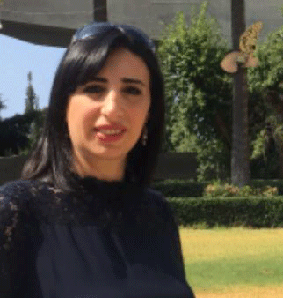
Disability Hub archive
Dr Itab Shuayb, Disability Hub, Centre for Lebanese Studies
The Disability Hub website serves as a vital platform offering comprehensive resources and information on disability studies, policies, services, and awareness campaigns in Lebanon, Jordan, and the wider MENA region. Since its release in 2020, the Disability Hub has been accessed by disability advocates, service providers, disability organizations, researchers, and various stakeholders interested in disability and inclusion from Lebanon and the Mena region.
A M Qattan Foundation Pilot Projects
Hosted and guided by the A.M Qattan Foundation, these pilot projects explore a range of media and art forms, to promote collaborative partnerships between cultural partners, disability-led organisations and practitioners and advocates working in the disability sector in the occupied Palestinian territories. The pilot projects contribute to Disability under Siege’s stated outcome of “revisiting and reframing disability discourse in conflict affected contexts”.
Four pilot projects were commissioned:
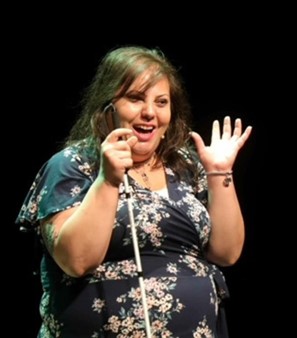
“No Cheri”, by Sharihan Hadweh
“No Cheri” is a stand-up comedy performance performed by Sharihan Hadweh, an actress with visual disability. The show was produced by Al-Harah Theater in partnership with Qader for Community Development, and is based on the stories and daily challenges of Sharihan as a person with disability where she taps on the very basic rights of people with disability in a black comedy way. The project gave Sharihan the chance to tour her own performance further in Palestine in order to create further awareness about rights of people with disabilities among local communities, as well as enhancing the inclusion of people with disabilities within performing arts as the first visually impaired actress on stage in Palestine.
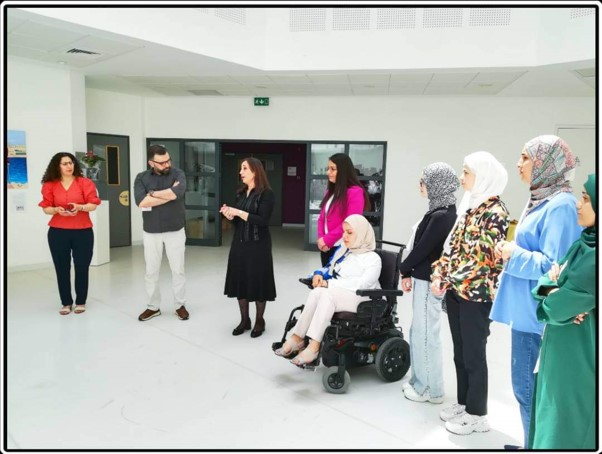
Samar Ghattas, artist
Samar Ghattas is a modern Palestinian visual Artist at Dar Al-Kalima University in Bethlehem, who created an artistic forum that brought together three emerging female artists with disabilities, to enhance their artistic skills and encourage them to produce independent works of art. The project also aimed to shed light on the suffering that persons with disabilities are exposed to as a result of conflict in Palestine.
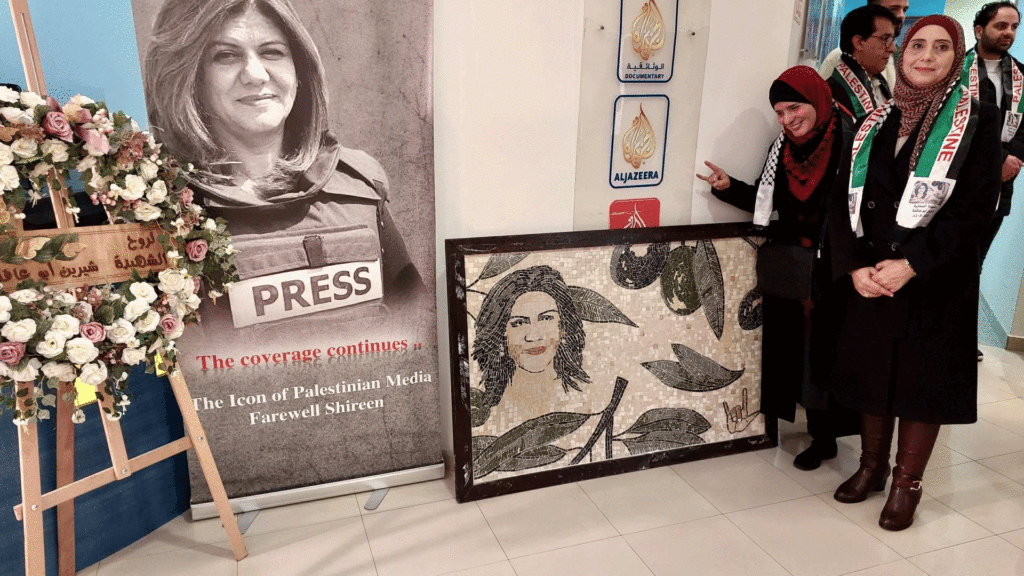
“Thank you note”
Passion for Arts and Crafts, based in Nablus, West Bank, created an inclusive artistic space for children with disabilities to express themselves freely and to empower them to participate in mosaics training and art making processes. Six children with learning disabilities joined artist Fidaa Shafi, to create a mosaic of Shireen Abu Aqleh, a distinguished and much-loved journalist. Shireen Abu Aqleh’s mosaic stands as a thank you to her and as a symbol of hope to reframe the discourses on disability in contexts of art and conflict in Palestine
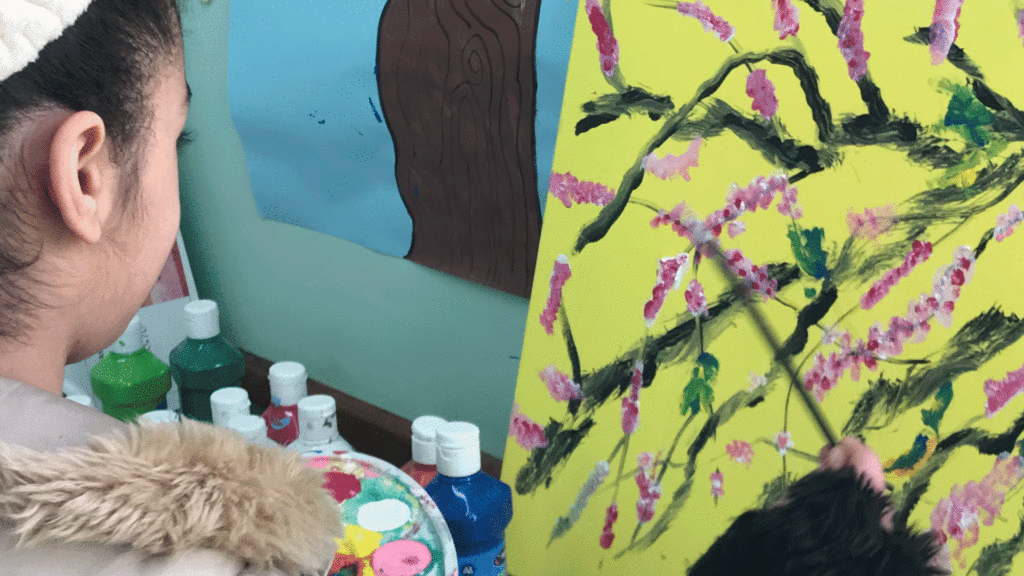
“Love Language”
Palestinian artists, Basel Elmaqosi and Maysaa Yousef, worked with 100 children with disabilities to produce artwork in different techniques using colour, cutting and pasting. The children were able to chose the topics they liked and learned many artistic techniques to create their art works.
Children, especially children with disabilities, need such initiatives that integrate them into society, especially with the continuation of conflict in Gaza. The children acquired new skills that enhance the value of individual work in collaboration with the group. The aim of this activity is to teach the participants a new way to release negative energy and enhance their self-confidence and distract from their fears.
A M Qattan Foundation & Disability under Siege Arts Showcase
Hosted and guided by the A.M Qattan Foundation, this Arts Showcase highlights five projects awarded the Disability Under Siege (DuS) grant, aligning with the program’s overarching goals. The showcased projects are designed to:
- Reshape public understanding of disability in contexts of conflict and crisis.
- Strengthen local, regional, and international capacities to address issues of access, equality, and participation in education.
- Build a lasting legacy by coordinating and integrating outputs from the program.
The cultural event aimed to:
- Extend the impact of DuS-commissioned cultural outputs and artefacts to broader audiences and new contexts.
- Translate findings from DuS research into cultural artefacts and performances.
The event included performances, presentations, conversations, and screenings which will provide the audience with an overview of the projects and their contributions to the DuS goals. The invited audience will include a diverse group of researchers, individuals, and organizations actively involved in disability discourse.
Covid-19 focussed research
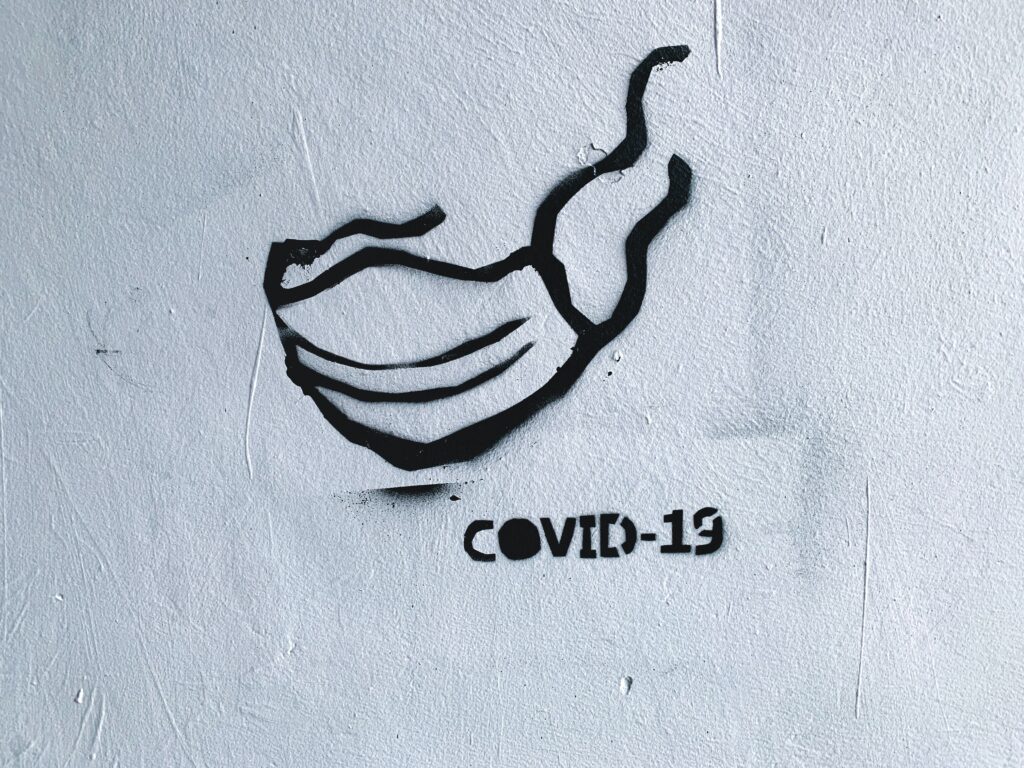
UNPRPD Analytical Framework – COVID-19 and disability in the Global South
In March 2021 the Arts and Humanities Research Council provided funding to the Disability Under Siege Network to undertake a 6 month project to research the impacts of Covid-19 on persons with disability in the Occupied Palestinian Territories, Lebanon and Jordan.

Comparative Case Study on the Impacts of COVID-19 on Persons with Disabilities in Jordan, Lebanon and Palestine
The rationale for this project is to build the research evidence base on the impacts of COVID-19 on persons with disabilities in the social, educational, economic and health sectors to inform the development of strategies for disability inclusive recovery and ‘building back better’ for more disability-inclusive societies.
Targeted research support
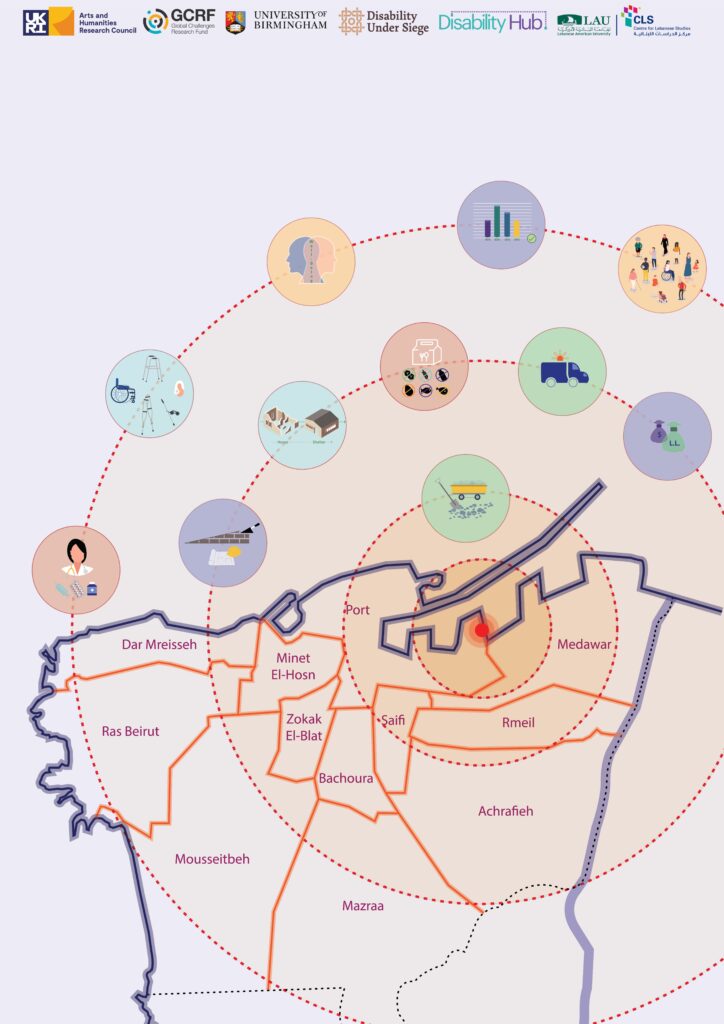
Mapping the Inclusivity of Needs Assessment and Reconstruction Initiatives During Beirut Blast Recovery Response
On August 4, 2020, a blast in Beirut’s port area caused immense damage to the city, killing approximately 200 people, and leaving 6,500 injured and over 300,000 displaced.
This study, written by Itab Shuayb and Sabine Douiery, examines the inclusivity of the emergency response and reconstruction efforts carried out by both governmental and non-governmental agencies after the Beirut Blast and their response to different groups affected by the Blast. While the study unpacks the rationale for inclusion, it aims to examine the current recovery and reconstruction initiatives and identify existing challenges and opportunities for an inclusive emergency response.
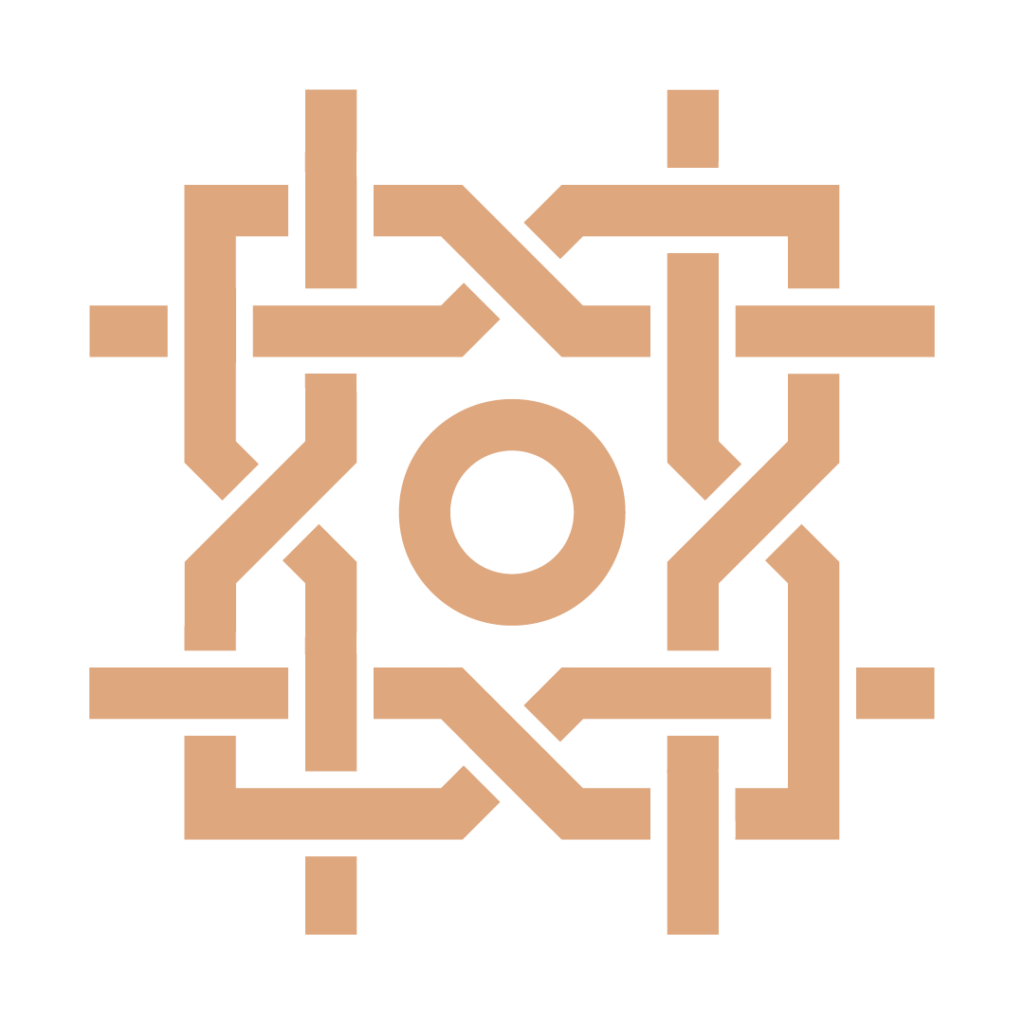
Accessibility to Higher Education for Palestinian Students with Disabilities Inclusive Policies and Practices Review
Higher Education institutions in the occupied Palestinian territories (oPt) seek to be inclusive of students with disabilities. However, there is a limited evidence base on the extent to which universities in oPt are accessible and the extent to which institutional policies support these aims. This research supports the Disability Under Siege Network Outcome that “new evidence is used to improve policies and practice with communities and educational settings.” This outcome will contribute to Sustainable Development Goal 4 “Ensure inclusive and equitable quality education and promote lifelong learning opportunities for all.
Other related networks
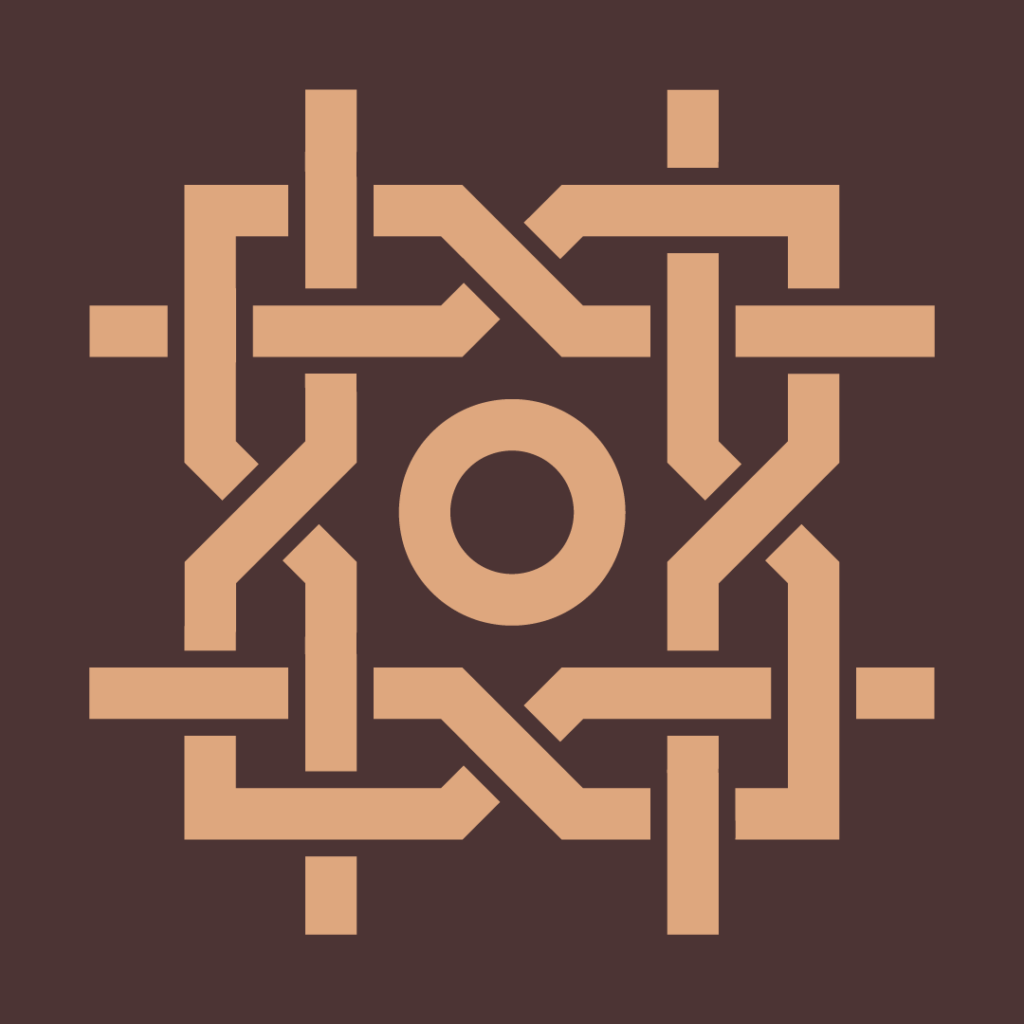
De-Institutionalisation under Siege
In January 2023, the Disability under Siege Network plus was awarded additional funding by the Arts and Humanities Research Council to create a network for deinstitutionalisation of persons with disabilities in the Middle East.
It is estimated that up to 15% of people with disabilities live in institutional care globally – 150 million people (UN, 2018), and this is likely to be an underestimate. Empirical evidence has shown that institutionalisation results in negative outcomes for children and adults, which has been further heightened during the Covid-19 pandemic, where there were disproportionate numbers of deaths of persons with disabilities in care institutions. The issue of deinstitutionalisation is of pressing global importance as highlighted at the Global Disability Summit 2022.
